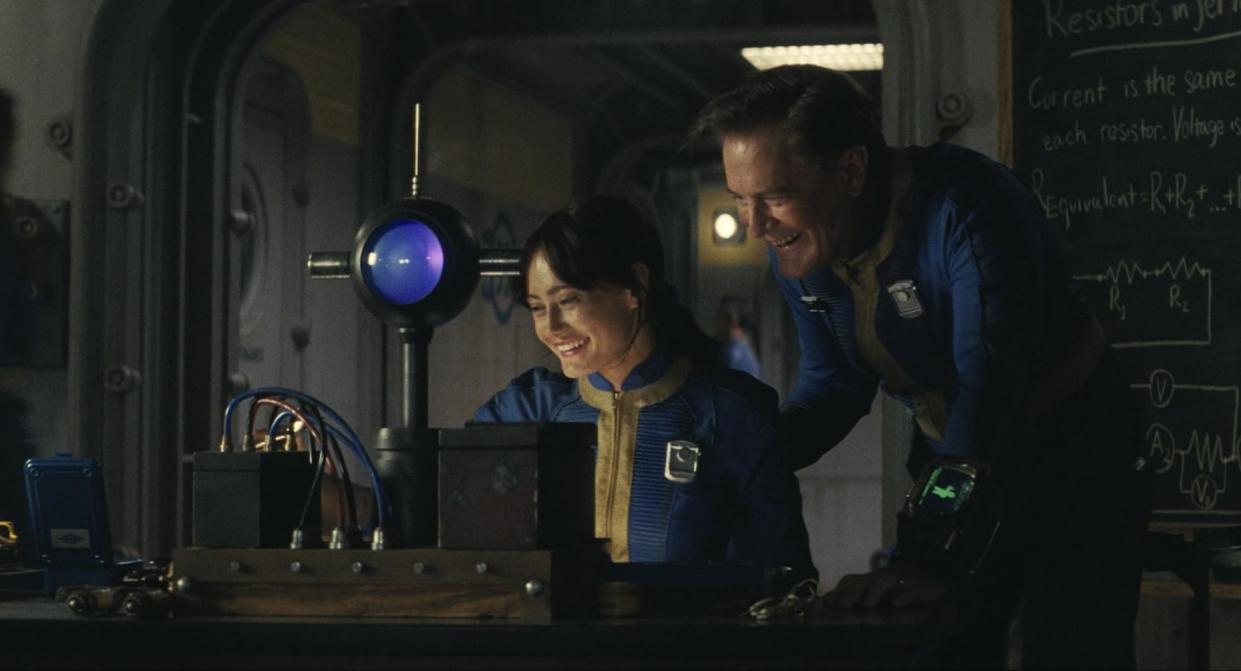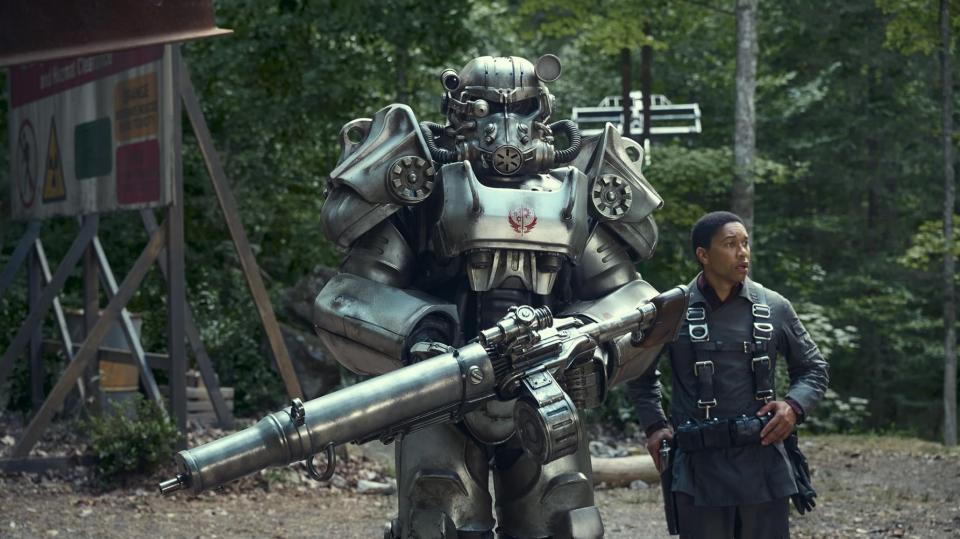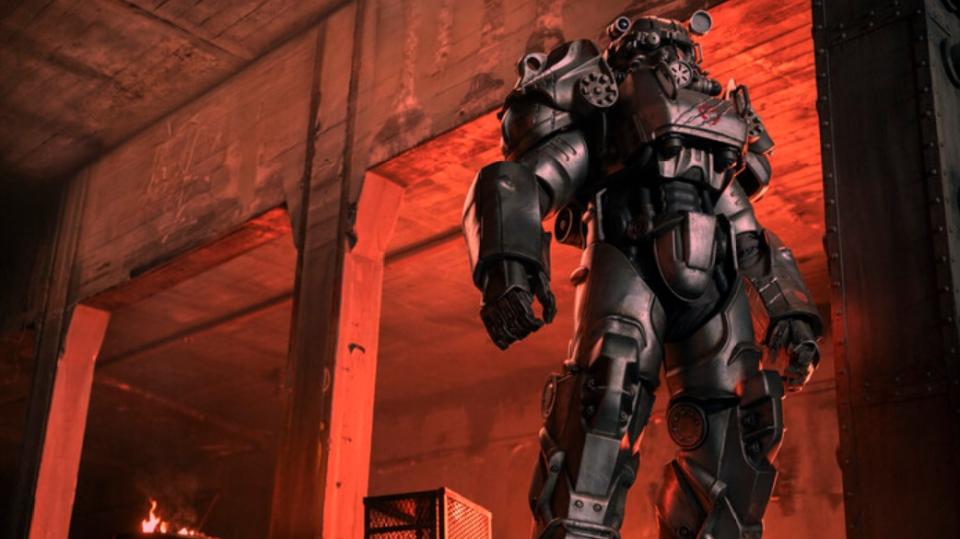Fallout TV series Season 1 review: Starting a flame in our hearts

"You forgot the golden rule of the wasteland: Thou shalt get sidetracked by bullshit every goddamn time."
So says The Ghoul (Walton Goggins), one of the protagonists in the Fallout TV series, accurately conveying a feeling that every single person who has ever played a Fallout game will inevitably hold at some point or another, realizing in simultaneous joy and despair that the small goal they meant to complete three hours ago has been waylaid by one promising side excursion after another.
Developed and produced by Amazon MGM Studios in partnership with Bethesda Game Studios and Bethesda Softworks, this series faces the gargantuan task of taking the world of the games and transporting it into an eight-episode season on Prime Video that's geared to be approachable for fans and newcomers alike. Having watched all eight episodes ahead of the series premiere, I'm happy to say it succeeds.
The stellar cast provides numerous entry points of perspective, as the show gives insight into the Brotherhood of Steel, life in the Wasteland, happy-go-lucky-innocent Vault Dwellers, and more. While the limited runtime of the season means a handful of ideas go without being fully explored, this is a fantastic ride through the world of gore and dark humor that is Fallout. Here's my spoiler-free review.
Fallout TV series Season 1: Review

The Fallout series kicks off in the year 2296, where Lucy MacLean (Ella Purnell) lives alongside her dad, Overseer Hank MacLean (Kyle MacLachlan) and dozens of others in Vault 33, part of a network that's connected to Vaults 32 and 31. Together, these Vault Dwellers are preparing for a hopeful, bright future where they no longer live underground. Lucy is every bit the Fallout protagonist, even getting to list off her multidisciplinary skill set, with a beaming sense of optimism not yet polluted by the cruelty of this world.
Outside of the Vault, we also follow Maximus (Aaron Moten), a hopeful in the Brotherhood of Steel who is eager to prove himself, but isn't quite sure of exactly who he is. Finally, there's The Ghoul (Walton Goggins), a feared and notorious gunslinger with connections to the old world, a killer who has far more going on than first meets the eye.
Naturally, events conspire that send Lucy hurrying out of the Vault and put these three on the tail of a mysterious scientist (Michael Emerson), as well as being put on a collision course with the dangers of the Wasteland, from raiders and radiation to mutants and mystery.
Straight away when watching this show, it's made abundantly clear that creator Jonathan Nolan and showrunners Geneva Robertson-Dworet and Graham Wagner understand the games they are drawing on. The set design of a Vault or shantytown in the wastes feels directly transported out of the games, while the T-60 power armor used by members of the Brotherhood of Steel looks absolutely amazing in motion.
Similarly, the action feels distinctly grounded in the universe, with no shying away from the copious amounts of gore that can unfold in the games when bullets and bombs start flying. Mutant monsters, ghouls, and humans alike are smashed, impaled, shot, and cannibalized across the series.

These three viewpoints are well-juxtaposed, providing a traditional Fallout protagonist perspective as well as different sides of life that would usually be reserved for exposition delivered by a player's in-game companion. This includes a lot of fun (if often brutal) side stories, moments where the universe is explored more in ways allow the downright weird parts of the setting to shine, and some of the B-plots here feel exactly like the kind of nonsense someone would run into while trying to accomplish an important goal in one of the games.
Every member of the cast is great, and while Goggins tends to steal the show with his portrayal of ruthless, genre-savvy pragmatism, Purnell and Moten are likewise wonderful to follow, with both selling the moral struggles their characters face in spades.
While most of the series takes place in the apocalyptic far future, we also get some occasional flashbacks to shortly before the bombs fell in 2077. These flashbacks are used sparingly but appropriately, giving key glimpses into the growing dread of American life in the build-up to a nuclear apocalypse. The Fallout franchise has examined ideas in the past like hyper-patriotism, nationalism, and the conflicting goals of what it means to continue (or even restart) society, and that's a thread that's carried through in this series front and center.
Despite its post-apocalyptic setting, Fallout juggles genres, often trading western standouts and bounty hunting for eerie science-fiction dread between scenes. There's variety here, and while I wish some scenes got just a bit longer to linger, it's hard to fault the sheer breadth of ideas covered in the span of this season.
All of this is underlined by a solid score from composer Ramin Djawadi (Gears 5, Game of Thrones, Westworld). Djawadi gives each of the leads their own motif, the wailing cord that signifies the presence of The Ghoul being a particular highlight. Much of the soundtrack is fittingly somber, with Djawadi leaning on Inon Zur's Fallout 4 at key points. There's also a bevy of old-timey licensed tracks, just as you'd expect from something in the Fallout universe.
If this series has one flaw, it's in the eight-episode length, something that Fallout is hardly unique in suffering from. While the very first episode of the season runs for over an hour, the subsequent episodes shave off anywhere from 10 to 20 minutes. Most of the story is allowed to breathe, and it's certainly a testament to the writing team and showrunners that things still flow very well overall, but I'm definitely left wanting more, wishing that some particular ideas or setups could've been explored just a tiny bit more. Even just one more episode (or having the majority of the season's episodes run for a few minutes longer) would've been enough.
Fallout TV series Season 1: Verdict

I was cautiously interested in this series ever since first hearing it would be a thing, and with every trailer or new interview, that interest grew. Now, having watched this first season's outing, I'm just hungry for more, and I'm already scrambling to concoct theories on just what is up next after some big teases in the finale.
There are a near-innumerable number of pain points where this series could've tripped, stumbled, and collapsed inward from the weight of its ambition. Instead, it hits the ground running, delivering an eight-hour story that feels satisfactory (if perhaps just a bit too snug) while still leaving plenty of room for things to grow in a likely second season and beyond.
It's the small things that end up mattering the most, and everything here just feels comfortably Fallout, from the set dressing to that uncomfortable first moment where someone gives in to drinking irradiated water. Almost everything on screen showed me that Nolan, Robertson-Dworet, Wagner, and everyone else involved in the creation of this series just get it. We might be waiting a long time for a new game, but this is the next chapter of Fallout, and I'm excited to see where it leads in the future.
All eight episodes of the Fallout series' first season will be available on Prime Video on April 10, 2024. Interested in more Fallout? Be sure to check out the library of games, including Fallout 3, Fallout: New Vegas, Fallout 4, and Fallout 76, all of which are playable on Windows PC and Xbox Series X|S consoles!
A note: I've got an interview coming up shortly, where I talked to series creator Jonathan Nolan, showrunners Geneva Robertson-Dworet and Graham Wagner, and several members of the cast about how the show came together, the nature of adapting a video game into a TV series, and more. You'll want to watch the first three episodes before reading it!
